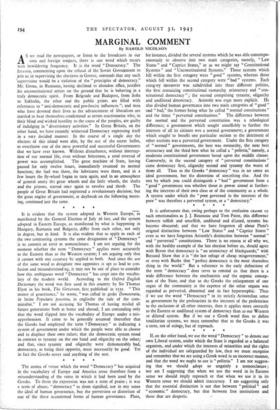The aroma of virtue which the word " Democracy "
has acquired in the vocabulary of Europe and America arose therefore from a misunderstanding of the sense in which it had been used by the Greeks. To them the expression was not a term of praise ; it was a term of abuse; "democracy " to them signified, not in any sense the ideal of human governance, but the perversion or distortion of one of the three accustomed forms of human governance. Plato, for instance, divided the several systems which he was able contempo- raneously to observe into two main categories, namely, " Law States " and " Caprice States," or as we might say " Constitutional Systems " and "Unconstitutional Systems." Those systems which fell within the first category were " good " systems, whereas those which fell within the second category were " bad " systems. Each category moreover was subdivided into three different polities, the first containing constitutional monarchy, aristocracy and " con- stitutional democracy " ; the second comprising tyranny, oligarchy and undiluted democracy. Aristotle was evert more explicit. He also divided human governance into two main categories of " good " and " bad," the former being what he called " normal constitutions " and the latter " perverted constitutions." The difference between the normal and the perverted constitution was a teleological difference; a government which sought unselfishly to further the interests of all its citizens was a normal goverrunent; a government which sought' to benefit one particular section to the detriment of other sections was a perverted government. Under the first category of " normal " governments, the best was monarchy, the next best aristocracy and the third best what he called a " politeia," namely, a moderate constitutional government based upon the middle classes. Conversely, in the second category of " perverted constitutions " came democracy first, oligarchy second and tyranny the worst of them all. Thus to the Greeks "democracy" was in no sense an ideal government, but the distortion of something else. And the test by which you could distinguish a " bad " government from a " good " government was whether those in power aimed at further- ing the interests of their own class or of the community as a whole. A system under which the " poor governed in the interests of the poor " was therefore a perverted system, or a " democracy." * * * *


























 Previous page
Previous page